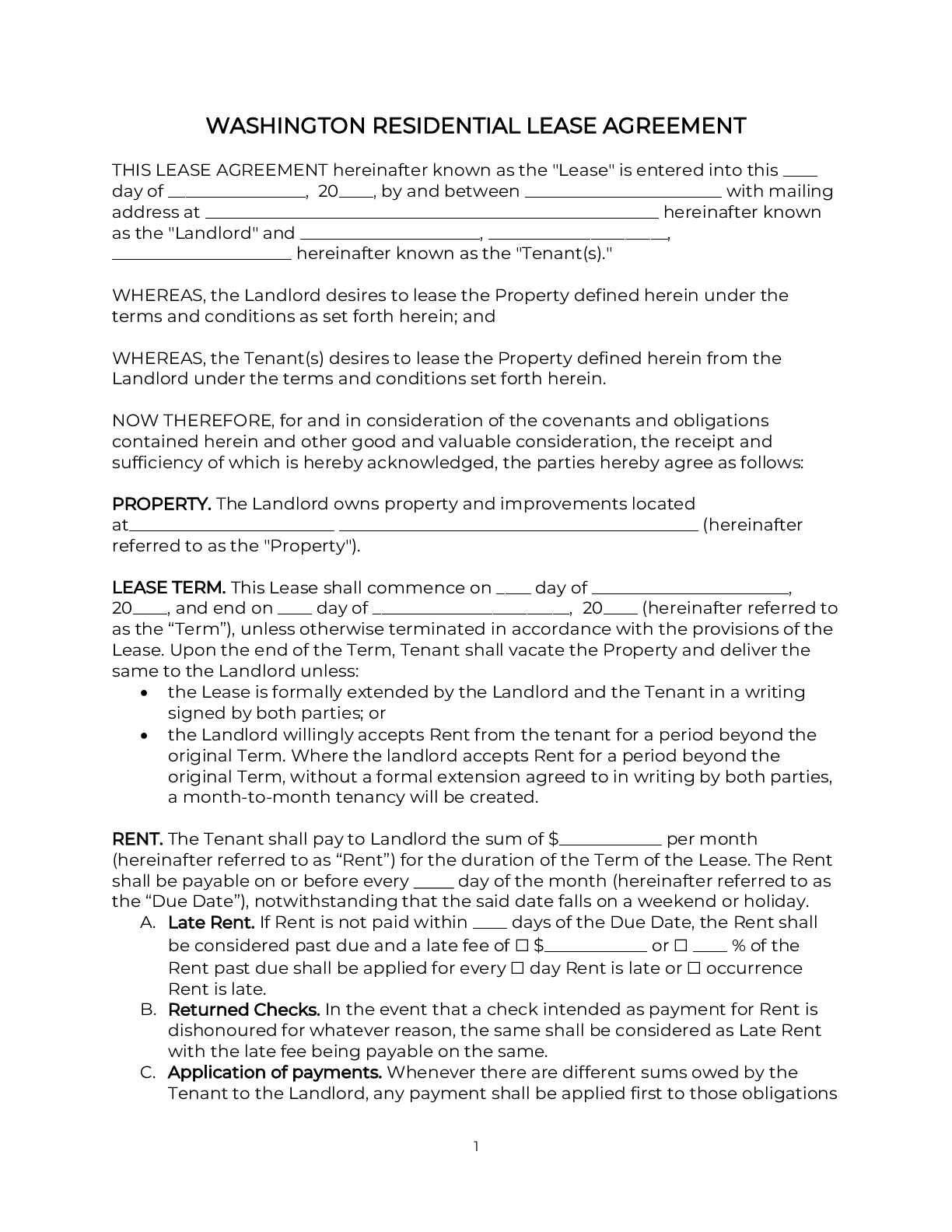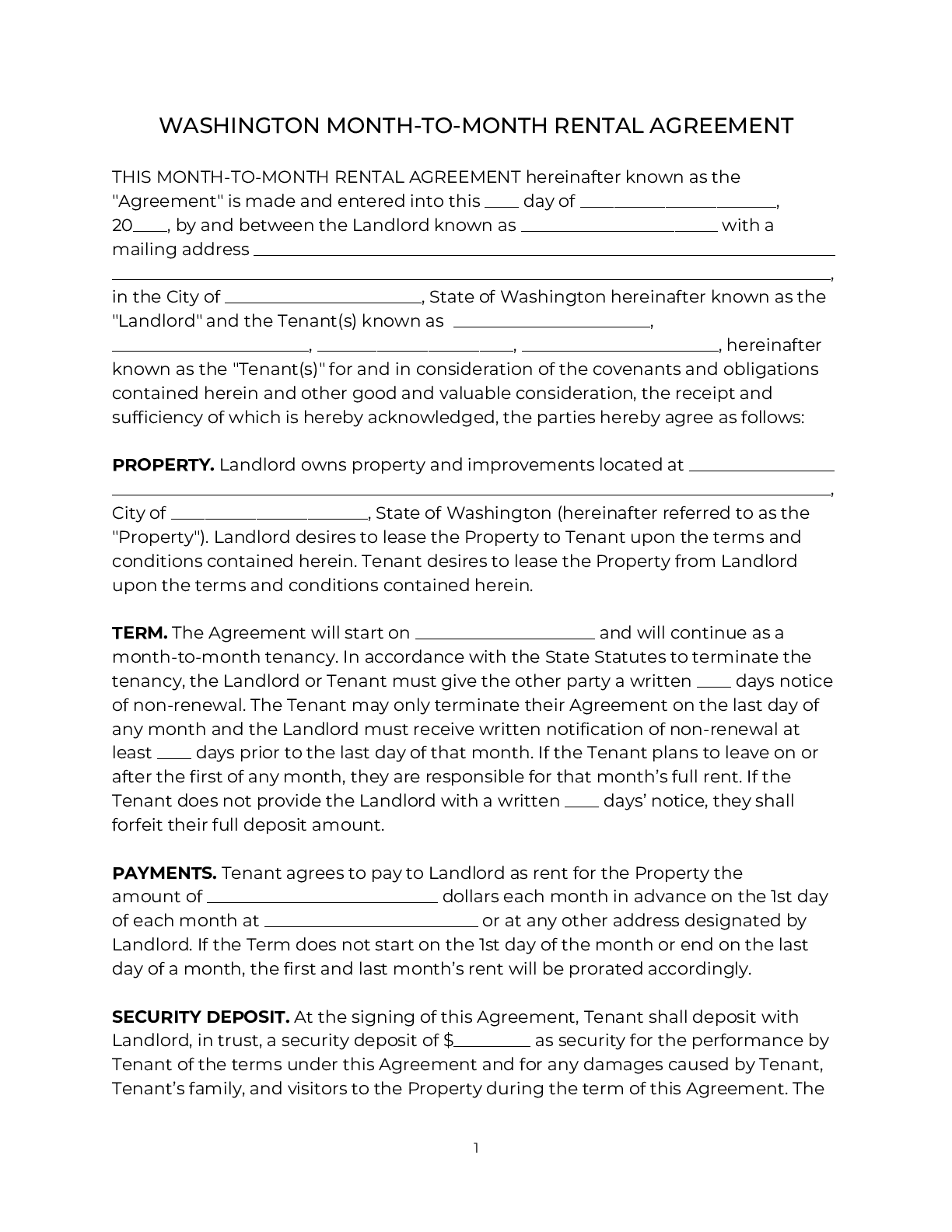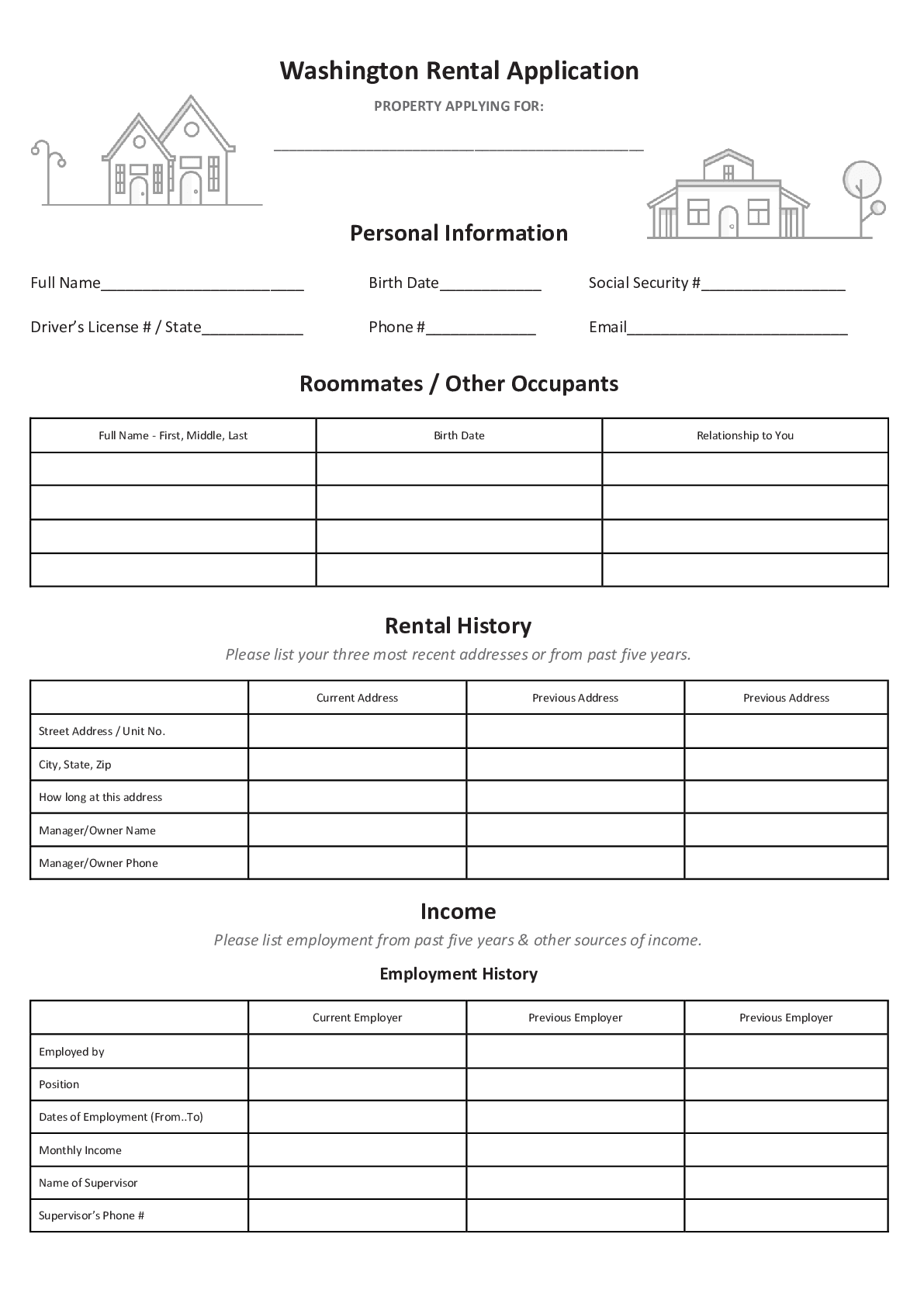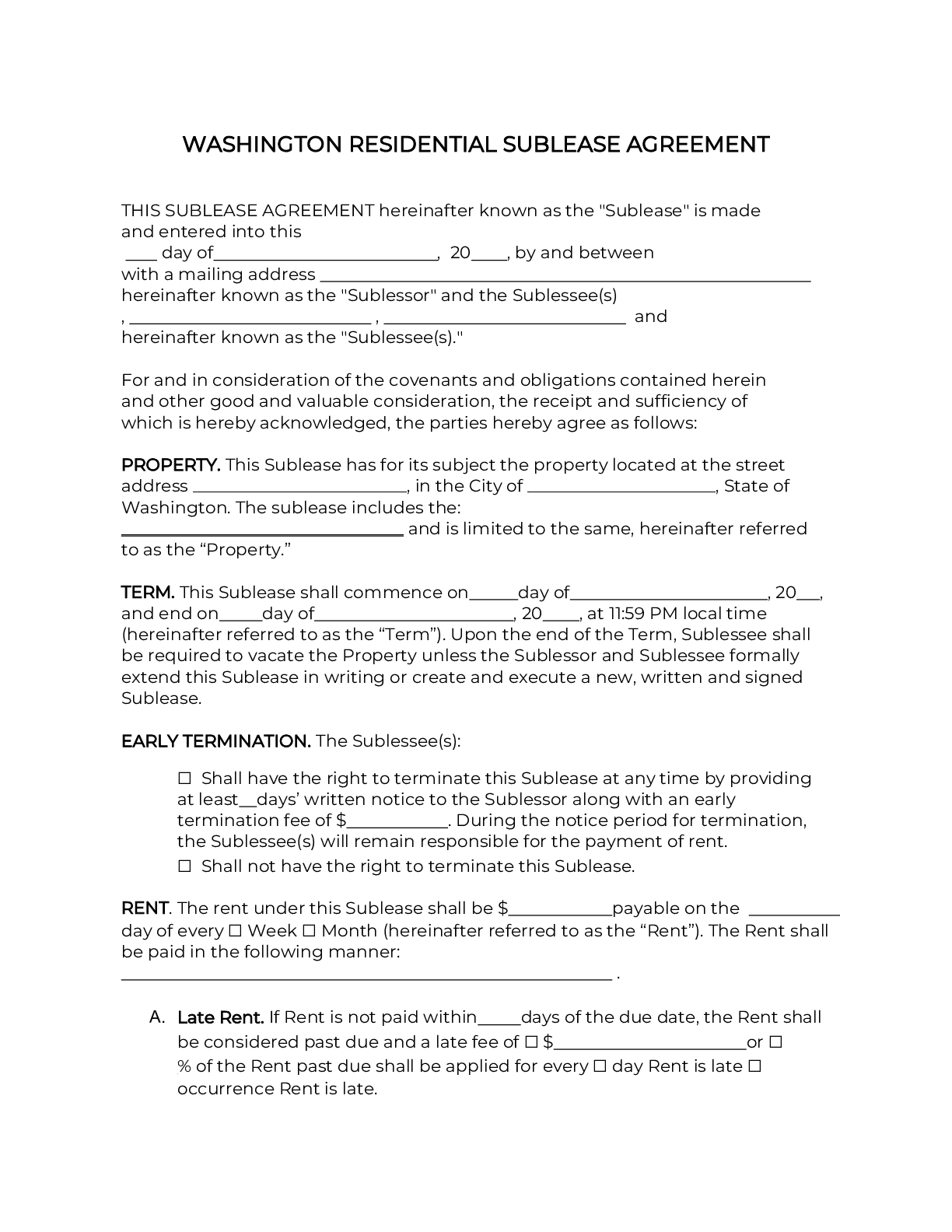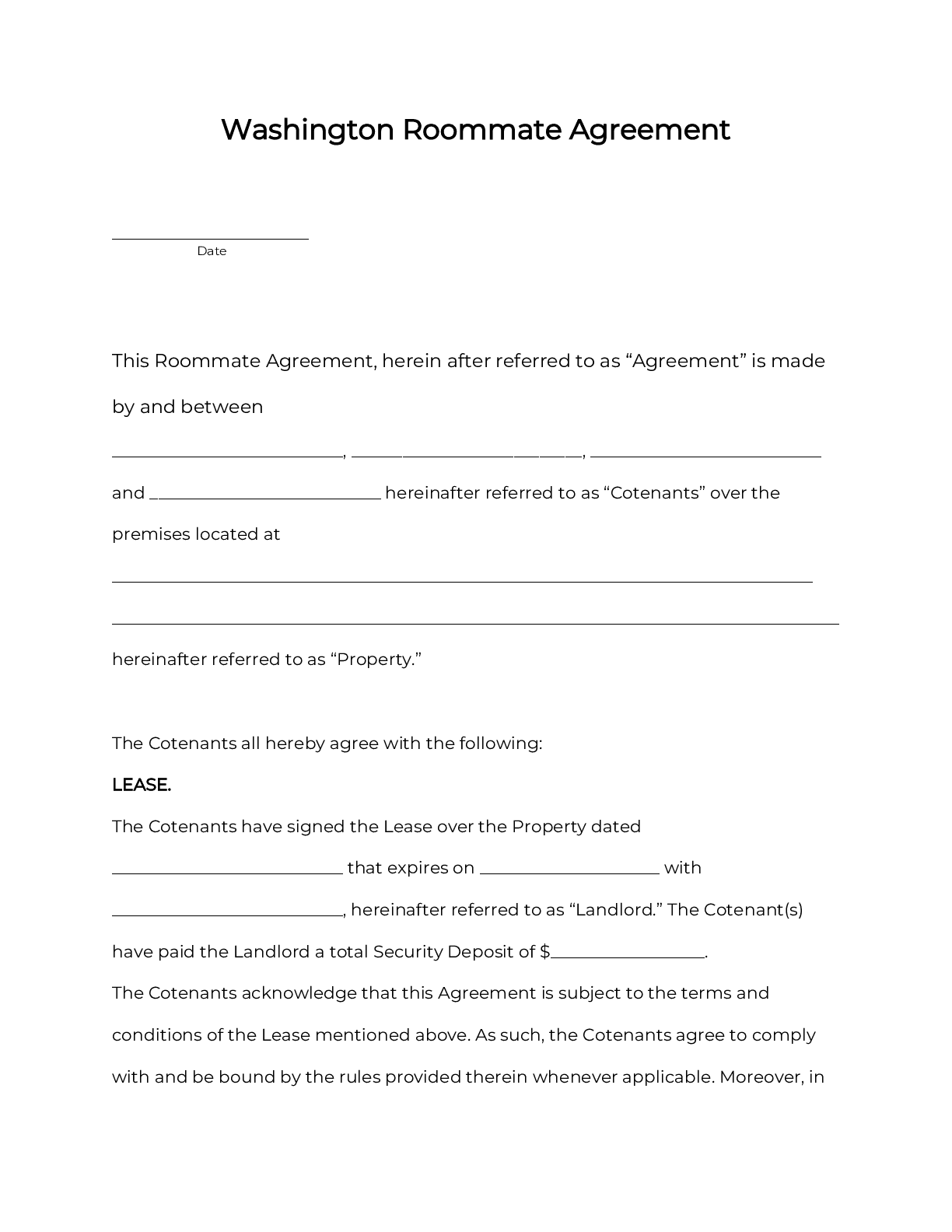A Washington rental agreement is a legal contract between a landlord overseeing a rental property and a tenant using the property. Washington landlord-tenant law governs and regulates these agreements.
Washington Rental Agreement Types
A Washington roommate agreement is a legal contract between two or more people (“co-tenants”) who share a rental property according to rules they set, including for things like splitting the rent. This agreement binds the co-tenants living together, and doesn’t include the landlord.
Washington Required Residential Lease Disclosures
- Landlord’s Name and Address (required for all leases) – Washington landlords must provide contact information in the lease, to ensure smooth communication and payment of rent in the event of any unusual situations. Typically includes additional contact information for the landlord and authorized agents, such as phone numbers and email addresses.
- Fire Safety and Protection Notice (required for some leases) – Washington leases must attach a written disclosure or checklist detailing the property’s fire safety features and emergency evacuation routes. This must detail the presence or absence of operational smoke detectors, fire sprinklers, and alarms on the property.
- Mold Disclosure (required for all leases) – Washington landlords must disclose mold risks and precautions relevant to the rental property. This can be done in the lease, or with a posted disclosure.
- Move-In Checklist (required for some leases) – Washington landlords collecting a security deposit must document the rental property’s condition when the tenant moves in. This is done with a written checklist which creates an itemized list of damages to deduct upon move-out. A landlord cannot deduct later for any item whose condition is not well described by the checklist.
- Security Deposit Holdings Disclosure (required for some leases) – Washington landlords who collect a security deposit must disclose certain details about where and how the funds are held, for transparency to the tenant.
- Fees Disclosure (required for some leases) – Nonrefundable fees must be disclosed in the rental agreement. This includes pet fees, access charges, and other expenses. Tenants may have a right to refund on any fees which aren’t explicitly agreed as nonrefundable.
- Lead-Based Paint Disclosure (required for all leases) – Landlords must provide an EPA-approved disclosure and informational pamphlet to tenants renting any property built before 1978.
To learn more about required disclosures in Washington, click here.
Washington Landlord Tenant Laws
- Warranty of Habitability – Washington can only rent out habitable property. This means providing certain basic health and safety features like heat, plumbing, electricity, and smoke detectors. Landlords have between 24 hours and 10 days after proper notice to make repairs, depending how serious and dangerous the issue is. Failure to repair might let a tenant end the rental agreement, ask a court to order repairs or compensation, or repair and deduct for lesser repairs. Washington tenants can’t withhold rent.
- Evictions – Washington landlords may evict tenants for rent default, lease violations, or illegal acts, among other things. The law requires a notice to pay, comply or quit, depending on the type of eviction. Most Washington evictions take between a few weeks to a few months. Unlike most states, many Washington properties have complex eviction requirements depending on their location and federal CARES act status.
- Security Deposits – Washington does not limit the amount of a security deposit. When a lease ends, the landlord must return any unused portion of a tenant’s deposit within 30 days.
- Lease Termination – Washington tenants can end month-to-month leases with 20 days of advance notice. Terminating a fixed-term lease early usually requires active military duty, landlord harassment, unit uninhabitability, or domestic abuse.
- Rent Increases and Fees – Washington doesn’t limit the amount of a rent increase. Any increases must receive at least 60 days of advance notice. Late fees are limited to $20 or 20% of the monthly rent amount (whichever is greater). Bounced check fees have a cap of $40, plus interest at a yearly rate of 12% from the date of dishonor.
- Landlord Entry – Washington landlords have the right to enter rental property for inspections, maintenance, showings, and emergencies. They have to give at least two days of written advance notice before entering, unless it’s an emergency situation.
- Settling Legal Disputes – Washington lets small claims courts hear landlord-tenant disputes, as long as the amount in controversy is under $10,000.
To learn more about landlord tenant laws in Washington, click here.
Sources
- 1 Wash. Rev. Code § 59.18.280(1)(c)
-
No portion of any deposit may be withheld:
(i) For wear resulting from ordinary use of the premises;
(ii) For carpet cleaning unless the landlord documents wear to the carpet that is beyond wear resulting from ordinary use of the premises;
(iii) For the costs of repair and replacement of fixtures, equipment, appliances, and furnishings if their condition was not reasonably documented in the written checklist required under RCW 59.18.260; or
(iv) In excess of the cost of repair or replacement of the damaged portion in situations in which the premises, including fixtures, equipment, appliances, and furnishings, are damaged in excess of wear resulting from ordinary use of the premises but the damage does not encompass the item’s entirety.
Source Link - 2 Sherwood Auburn LLC v. Pinzon, 521 P.3d 212, 220 (Wash. Ct. App. 2022)
-
…the plain language of the CARES Act notice provision requires that landlords subject to the act provide a 30-day notice to tenants prior to commencing an unlawful detainer action.
Source Link - 3 KHCA v. Knight, No. 85031-8-I, at 18 (Wash. Ct. App. Feb. 26, 2024)
-
…the plain meaning of Section 4024’s 30-day notice to vacate provision is that it applies only to evictions stemming from nonpayment of rent.
Source Link - 4 Pendleton Place, LLC, v. Asentista, No. 58118-3-II (Wash. Ct. App. Jan. 9, 2024)
-
…we conclude that the 30-day notice provision in 15 U.S.C. § 9058(c)(1) applies to all evictions of tenants living in covered dwelling units, not just those for nonpayment of rent.
Source Link - 5 Wash. Rev. Code § 59.18.280(1)(a)
-
Within 30 days after the termination of the rental agreement and vacation of the premises or, if the tenant abandons the premises as defined in RCW 59.18.310, within 30 days after the landlord learns of the abandonment, the landlord shall give a full and specific statement of the basis for retaining any of the deposit, and any documentation required by (b) of this subsection, together with the payment of any refund due the tenant under the terms and conditions of the rental agreement.
Source Link - 6 Wash. Rev. Code § 62A.3-515(a)
-
If a check as defined in RCW 62A.3-104 is dishonored by nonacceptance or nonpayment, the payee or person entitled to enforce the check under RCW 62A.3-301 may collect a reasonable handling fee for each instrument. If the check is not paid within fifteen days and after the person entitled to enforce the check or the person’s agent sends a notice of dishonor as provided by RCW 62A.3-520 to the drawer at the drawer’s last known address, and if the instrument does not provide for the payment of interest or collection costs and attorneys’ fees, the drawer of the instrument is liable for payment of interest at the rate of twelve percent per annum from the date of dishonor, and cost of collection not to exceed forty dollars or the face amount of the check, whichever is less, payable to the person entitled to enforce the check. In addition, in the event of court action on the check, the court, after notice and the expiration of the fifteen days, shall award reasonable attorneys’ fees, and three times the face amount of the check or three hundred dollars, whichever is less, as part of the damages payable to the person enforcing the check. This section does not apply to an instrument that is dishonored by reason of a justifiable stop payment order.
Source Link




